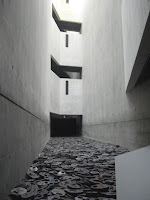Friends,
Having returned from two weeks in Europe (Hungary, Sweden, Finland, and Berlin), I have been sorting through my thoughts and emotions, as I also had to catch up, prepare and present at a conference. Fortunately, my son and daughter have uploaded dozens of photos to Facebook, sparing me that job.
What really stands out for me is how the Germans have done a better job than anyone at facing up to the Holocaust of World War II, and both the Jewish Museum (Jüdisches Museum Berlin)

and the Memorial to the Murdered Jews in
Europe (
Denkmal für die ermordeten Juden Europas)
are stark and stunning reminders of the emptiness in much of Europe because of the near total elimination of its Jews by the Nazis and their collaborators.

The moral responsibility belongs, rightfully, to Germany, but many Hungarians seem to avoid acknowledging their role and, like other countries that became part of the Soviet bloc, they have contextualized the deaths within a narrative about the country’s many dead citizens during the war.
Recently, there has been a resurgence of right wing activity and what had once been seen as a fringe far-right party, Jobbik, grabbed nearly 15 percent of Hungary’s vote in European Union parliamentary elections in June. Budapest has its own memorial to Jews on the Promenade along the Danube on the Pest side—a series of bronzed men’s, women’s and children’s shoes depicting those that were left behind after Hungary’s Arrow Cross militiamen rounded up Jewish citizens, shot them, and they fell into the icy waters, sometimes dead, often left to die. Just before our visit there, unidentified vandals desecrated the memorial by placing pigs’ feet among the shoes.

Hungary’s Prime Minister, Gordon Bajnai, stated that his government rejects Jobbik’s ideology and supports a ban on Holocaust denial in Hungary. Bajnai and others warn about resurgent anti-Semitism throughout Europe, and I was left feeling that other Holocausts and "ethnic cleansings," such as those in Bosnia and Herzegovina and Kosovo, are still possible in a Europe that, despite its economic union, is a collection of independent nations whose people often harbor ancient prejudices against others.
Berlin also built a memorial to Gays who were murdered in the Holocaust (not far from the Jewish Holocaust Memorial, it is evocative of a bunker with a window through which is seen a film of two men kissing), and construction finally began on a memorial to the Roma/Sinti (Gypsies)--twenty-five percent of whom were murdered from 1939-1945. Their tragedy was largely ignored after the war, and they still face discrimination throughout Eastern and Central Europe. While West Germany finally acknowledged that the killing of Roma/Sinti was racially motivated, it did so in 1979, by which time most survivors eligible for compensation had already died.

On a final, more upbeat note, it's Springtime for Hitler at the famed Admiralspalast Theatre (where Hitler would watch operettas) as The Producers finally arrived in Berlin. Because the swastika is banned in Germany, the pretzel takes its place on banners, flags and armbands. According reviews, the musical has played a cathartic role among audiences, giving them a chance to laugh with the rest of the world and to shake off temporarily their national guilt.
Talk to you soon!
Bob







